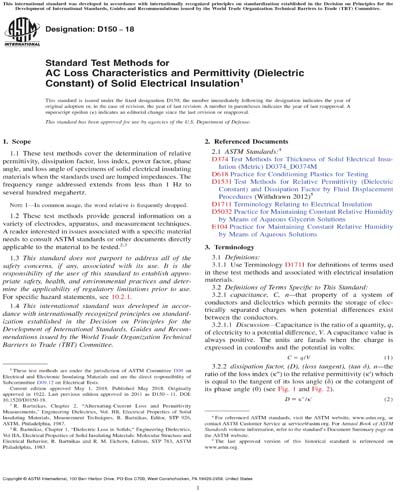Historical
ASTM D150-18
Standard Test Methods for AC Loss Characteristics and Permittivity (Dielectric Constant) of Solid Electrical Insulation
1.1 These test methods cover the determination of relative permittivity, dissipation factor, loss index, power factor, phase angle, and loss angle of specimens of solid electrical insulating materials when the standards used are lumped impedances. The frequency range addressed extends from less than 1 Hz to several hundred megahertz.
Note 1: In common usage, the word relative is frequently dropped.
1.2 These test methods provide general information on a variety of electrodes, apparatus, and measurement techniques. A reader interested in issues associated with a specific material needs to consult ASTM standards or other documents directly applicable to the material to be tested.2,3
1.3 This standard does not purport to address all of the safety concerns, if any, associated with its use. It is the responsibility of the user of this standard to establish appropriate safety, health, and environmental practices and determine the applicability of regulatory limitations prior to use. For specific hazard statements, see 10.2.1.
1.4 This international standard was developed in accordance with internationally recognized principles on standardization established in the Decision on Principles for the Development of International Standards, Guides and Recommendations issued by the World Trade Organization Technical Barriers to Trade (TBT) Committee.
ASTM International [astm]

